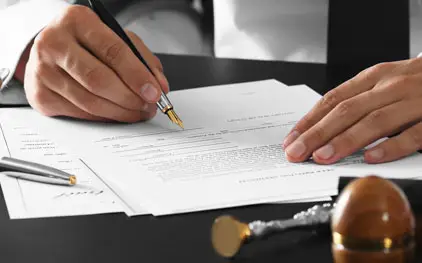-
Jun 03, 2024
-
Harrrison Carroll

Having a document notarized is an important phase in a number of legal and governmental processes. So then, where does one get a document notarized? Here’s a step-by-step guide that makes it easy for you to comprehend this process.
Remember, Proper Identification should be given by the client.
A notary is also under the duty of confidentiality besides.
Get more information about it by visiting the New York Department of State.
A comprehensive step-by-step guide is given below to help you navigate through this process.
Where to get a Document Notarized
1. Banks and Credit Unions:
Most banks and credit unions provide notary services to their customers. It may be free, or you may pay a small fee. This is a convenient option because banks typically have notaries available during normal business hours. However, it’s smart to check to see if your branch provides this service.
2. Law Firms and Legal Offices:
Most credit unions and banks will have a notary that will perform a notarization on their client at no extra fee or only a minimal fee. This could be an effective option since most banks have access to notaries within regular business hours.
3. UPS Store, FedEx Office, and Postal Offices
Shipping and postal offices like UPS Store, FedEx Office, and even some post offices offer notary services.
4. Public Libraries:
There are some public libraries with in-house notaries who offer their services free of charge or at a minimal cost. This is especially good for those who want to have a low-cost or public-based option for notarization. But, call ahead at your local library before visiting.
5. Mobile Notary Services:
If you’re unable to visit a notary in person, or if you need a document notarized outside of regular business hours, you can hire a mobile notary. Mobile notaries travel to your location, whether it’s your home, office, or another agreed-upon meeting place, to notarize your documents for a fee. This option offers flexibility and convenience but may be more expensive than other alternatives.
6. Online Notary Services:
With advancements in technology, online notary services have become increasingly popular. These services allow you to get your documents notarized remotely via video call with a commissioned online notary. While this option offers convenience, especially for individuals unable to leave their homes, it’s essential that online notarization is legally recognized in your jurisdiction.
7. Government Offices:
Certain government offices, such as county clerk offices or courthouses, may have notaries available to assist with document notarization. While this option is not always be widely advertised, it’s worth checking with your local government offices to see if notary services are available.
Essential points you should keep in Mind:
Identification:
We told you so in the beginning of this article. You typically must show a valid identification, such as a driver’s license or passport, or government ID.
Witnesses:
Depending on what type of document you are signing, you may require witnesses over to sign off on the signing.
Fees:
The notary fees differ depending on the service business and where you reside. So, ensure you inquire about the fee first to catch you unaware.
Conclusion:
Be aware, there are choices. Whether you opt for a bank, attorney office, shipping facility, public library, mobile notary, online agency, or government office, you should select a solid and reliable provider to ensure the authenticity of your documents. Being aware of your choices and considering your specific needs, you can efficiently go through the process of notarization and proceed with confidence in your legal and administrative endeavors.
Finally, we hope you find this article helpful. If you think you want to become a notary, we can help you prepare to pass the New York Notary Exam.
Comments are closed.